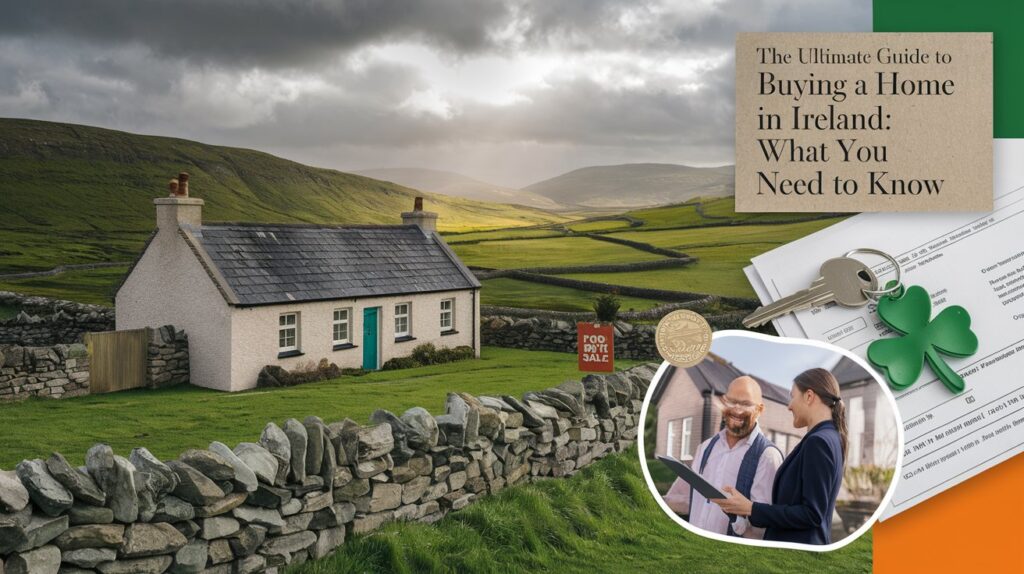Buying a home is one of the biggest financial commitments you’ll ever make-and in Ireland, it can feel like navigating a maze of mortgages, paperwork, and property jargon. Whether you’re a first-time buyer or making your next move, it’s important to understand the steps involved, what to look out for, and what protections (like insurance) are required along the way. That’s why we’ve also included an insurance guide for first-time buyers, so you know exactly what cover you need-and when.
In this guide, we’ll walk you through the essential things to know before buying a home in Ireland, from sorting your finances to finalising your insurance.
1. Understand Your Budget
Before you fall in love with a charming three-bed semi or a sleek city-centre apartment, you need a clear picture of how much you can afford.
Key considerations:
- Deposit: First-time buyers need at least 10% of the property price as a deposit. For others, it’s typically 20%.
- Mortgage lending rules: Under the Central Bank’s guidelines, you can usually borrow up to 4 times your gross annual income.
- Other costs: Budget for solicitor fees, stamp duty (1% of the purchase price up to €1 million), property surveys, valuation fees, and insurance.
Having a mortgage approval in principle gives you a realistic view of your price range and puts you in a stronger position when bidding.
2. Choose the Right Mortgage
There are several mortgage types available in Ireland, and your choice will impact your monthly payments and long-term costs.
Most common options:
- Fixed-rate mortgages: Your interest rate is fixed for a certain period (e.g. 3, 5, or 10 years), providing certainty on repayments.
- Variable-rate mortgages: Your rate can rise or fall, which means your payments could change.
- Green mortgages: Offered for energy-efficient homes (usually BER B3 or better), these typically come with a discounted rate.
Compare mortgage providers, not just for interest rates but also for cashback offers, fees, and customer service. A mortgage broker can help you assess your options across multiple lenders.
3. Find the Right Property
When viewing homes, don’t just fall for appearances-look deeper.
Things to consider:
- Location: Check public transport, schools, local amenities, and commute times.
- Energy efficiency: Look at the Building Energy Rating (BER). A better rating (A or B) means lower heating bills.
- Structural condition: Cracks, dampness, and signs of wear could mean costly repairs down the line. Always get a professional survey done.
If you’re buying a second-hand home, it’s wise to have a building survey carried out. For new builds, focus on snag lists and what warranties are included.
4. Hire a Solicitor (Conveyancer)
You’ll need a solicitor to handle the legal side of your purchase, including:
- Reviewing contracts
- Ensuring there are no issues with title deeds or planning permission
- Managing the transfer of ownership
Start looking early, as a good solicitor can help the process move smoothly-especially once you’ve had an offer accepted.
5. Make an Offer and Go Sale Agreed
Once you find the right property, you’ll make a formal offer through the estate agent. If accepted, the property status changes to “sale agreed”, but this isn’t legally binding yet.
At this stage:
- Pay a booking deposit (usually €5,000)
- Organise a property valuation (required by your mortgage lender)
- Finalise your mortgage approval
6. Exchange Contracts and Pay the Full Deposit
Your solicitor will review the contracts from the seller’s solicitor. Once both parties are satisfied:
- You sign the contracts
- Pay the remaining balance of the deposit (typically 10% of the purchase price, minus the booking deposit)
Now the deal is legally binding.
7. Get the Right Insurance
Before your mortgage can draw down (i.e. the money is released), you’ll need to have two key types of insurance in place:
1. Mortgage Protection Insurance (Life Insurance)
This is a legal requirement for most mortgage holders in Ireland. It pays off the remaining mortgage balance if you or another borrower dies during the mortgage term.
Some exemptions apply, such as:
- You can’t get cover due to health issues
- The mortgage is for an investment property
Your lender will typically offer mortgage protection, but it’s worth shopping around-independent providers may offer better value.
2. Home Insurance (Buildings Cover)
You must have buildings insurance in place before you draw down your mortgage. It covers damage to the structure of your home (e.g., due to fire, flood, or storm).
Lenders require this to protect their investment, but again, you can choose your own insurer.
Optional but recommended:
- Contents insurance: Covers personal belongings and furnishings.
- Income protection or serious illness cover: Offers added peace of mind if illness affects your ability to repay your mortgage.
8. Close the Sale and Get Your Keys
Once all the legal work is complete and your mortgage has drawn down, your solicitor will:
- Transfer the funds to the seller’s solicitor
- Register the property with the Land Registry
- Pay stamp duty on your behalf
You’ll then receive the keys-and officially become a homeowner!
Final Thoughts
Buying a home in Ireland involves careful planning, plenty of paperwork, and more than a little patience-but it’s also an exciting milestone. By understanding the process, getting the right advice, and protecting your investment with the right insurance, you can move into your new home with confidence.
If you’re unsure where to start, consider speaking to a mortgage broker or financial advisor who can guide you through the journey step by step.

